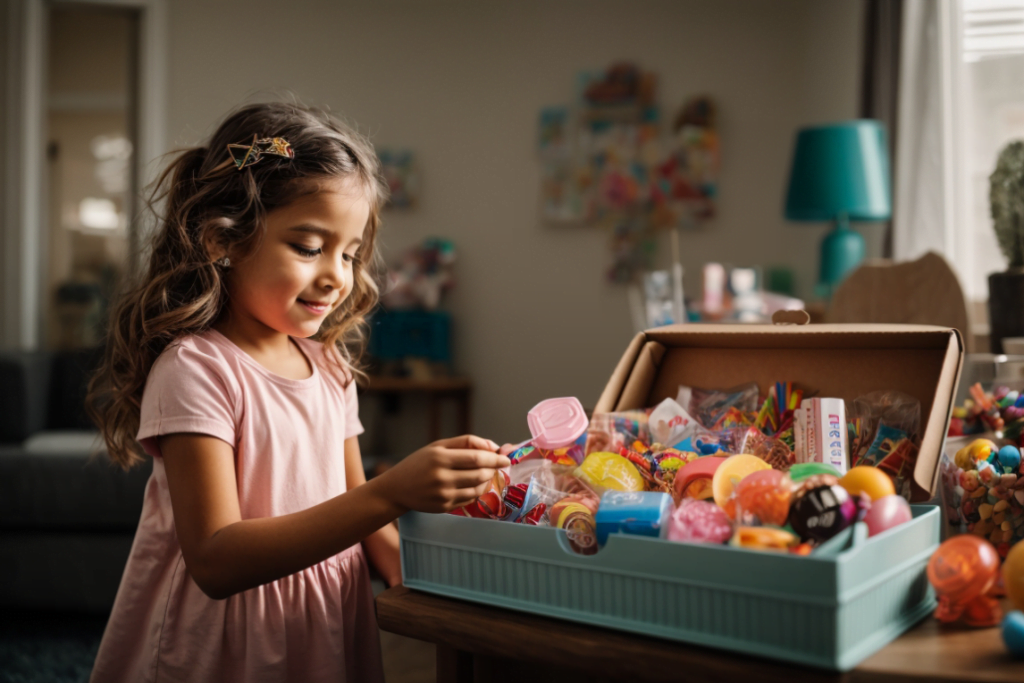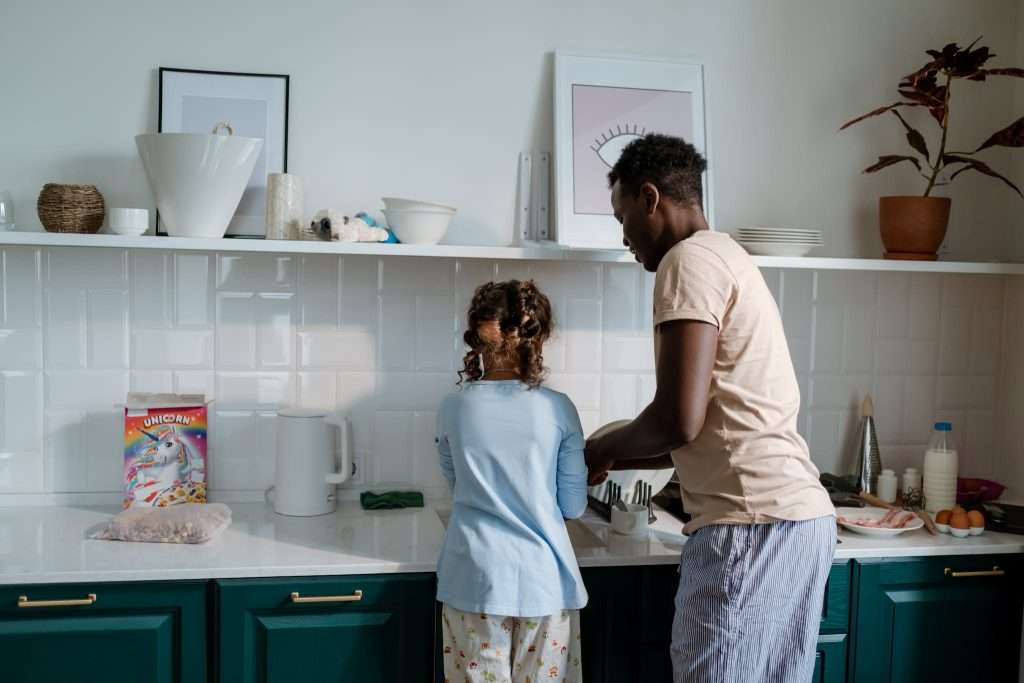Key Takeaways
- Make It a Game: By converting chores into games and competitions, children’s natural love for play and rewards can be harnessed to motivate them.
- Customization Matters: Personalized chore charts, kits, and tools give kids a sense of ownership and pride.
- Incentivize with Rewards: Using a point system, prizes, and special treats can fuel motivation and enthusiasm.
- Engage the Senses: Incorporating music, stories, and imaginative play makes chores more enjoyable and relatable for kids.
- Foster Teamwork: Promoting family chore times and team tasks strengthens bonding and emphasizes the importance of group effort.
- Offer Variety and Choices: Rotating tasks and allowing kids to choose prevents monotony and gives them a sense of agency.
- Combine Chores with Learning: Use chores as opportunities to teach kids practical skills, financial literacy, and other valuable lessons.
- Consistency and Flexibility: Implementing consistent chore routines while being adaptable ensures long-term success.
- Importance of Age-Appropriateness: Assigning chores that match a child’s developmental level ensures they can successfully complete them and feel accomplished.
- Benefits Beyond Cleaning: Regular chores teach responsibility, time management, cooperation, and other skills that lead to personal growth and future success.

Transforming Chore-Time into Family Fun Time
Let’s be honest: getting kids to pitch in with chores without constant nagging can often feel harder than climbing Mount Everest! The whining, negotiating, and dirty looks are all too real for parents. But what if I told you there are secret hacks to not only get your kids doing chores but actually begging to help out more? Yes, you read that right—kids who look forward to chore time and willingly take on tasks. Too good to be true? Not when you tap into the power of making chores fun!
The Key is Transforming Chores Into a Game
Children naturally enjoy play, friendly competition, and earning rewards. The key to making household chores successful is channeling that enthusiasm by transforming routine tasks into fun challenges. By appealing to their sense of adventure and competition, even cleaning chores like scrubbing toilets can become an exciting game! Discover 25 creative ideas to turn chore time into enjoyable family activities and make cleaning the house a fun experience for everyone.
1. Make Custom Chore Charts
Kids enjoy checking off completed chores from a list! Encourage them to create a personalized kids chore chart by decorating it with colorful stickers and markers. Displaying the chore chart on the fridge with magnets gives it extra importance and visibility. Always make sure chores are age-appropriate—no lawn mowing for toddlers!
2. Host contests and races
A bit of friendly competition can make household chores more fun for kids! Try timing your children as they clean and offer a small reward to the fastest cleaner. You can also organize challenges to see who can stack dishes the quickest or gather the most dirty laundry. Turning chores into a race against the clock transforms routine cleaning tasks into an exciting game, making tidying up more engaging for kids.
3. Assign points to tasks
Create a chore point system for kids by assigning points to each household task based on its difficulty level. Simple chores like picking up toys can earn 5 points, while more challenging tasks such as deep cleaning the bathroom can be worth 50 points. Allow children to redeem their earned points for rewards like a movie outing or extra screen time on their tablet. Using a visual points chart helps boost motivation and keeps kids engaged in completing their chores.

4. Offer prizes for job completion
Small incentives go a long way with kids. Create a “Chore Rewards Bucket” they can pick from after finishing tasks; include bubbles, art supplies, candy, and other motivating treats. Random surprise rewards keep them on their toes!
5. Make custom chore kits
Give kids a sense of ownership by letting them pick out special supplies—mini brooms, custom dusters, fun sponges, etc. Having their own personalized cleaning tools kits makes them feel important and eager to put supplies to use.
6. Blast fun music
Studies show tunes make tasks more enjoyable. Let kids create epic chore playlists to rock out to while they work. Upbeat music they love makes duties feel like a dance party!
7. Get silly
Laughter relieves chore boredom. Challenge kids to unload dishes while doing a funky dance or vacuum while pretending to be bears looking for food. Adding an element of silliness makes chores feel like playtime.
8. Turn tasks into a story
Little kids especially love make-believe. Turn chore time into an imaginative adventure—scrubbing floors becomes erasing a giant’s footprints, or laundry folding is helping fairies make beds. A touch of fantasy transforms chores from drudgery to fairytale fun.
9. Create special family chore times
Set a weekly family chore night when everyone comes together to tackle cleaning. Order pizza as a reward after, play music, and make tasks bonding time. Kids love traditions and look forward to things you do together.
10. Let them get wet and messy
Kids find hosing down patios or splashing soapy water intrinsically fun. Take advantage by letting them scrub outdoor surfaces, wash cars, or give pets baths. Messy duties feel like playtime.
11. Incorporate learning experiences
Chores present great real-world teaching moments. Show how sorting laundry helps cognitive skills. Identify shapes and patterns when folding. Explain the science concepts used to clean. Kids love learning through hands-on tasks!
12. Make chore checklists together
Kids feel ownership when involved in planning. Ask them to help you brainstorm and write down chores that need doing around the house. Let them decorate the list and proudly display it. Taking part gets them invested.
13. Have a dance party
As mentioned, music makes chores happier – amp it up with full dance parties! Pull out hairbrushes as microphones, spin mops as partners, and get your groove on while you clean. Your kids will be having so much fun they won’t even realize they’re working.
14. Tell stories while you work
Storytelling is engaging and also distracts from chores. Come up with silly tales about the adventures of Dusty the Duster looking for missing toys or the escapades of Moppy trying to clean a royal ball. Let your kids’ imaginations run wild too!
15. Make tasks a game
Turn duties into fun challenges: Who can collect the most socks in a laundry basket to win? How fast can you reorganize the pantry before the timer goes off? Can we beat our high score of dishes washed? Framing chores as games and competition removes dread.
16. Give surprisingly fun supplies
Sometimes it’s as simple as letting kids use fun cleaning tools—jelly scrubbers, neon sponges, funky gloves, feathery dusters, etc. Anything that makes supplies more enjoyable to use prevents chore boredom.
17. Offer rewards
After chores are done, let kids pick from a prize box filled with motivating treats – small toys, art supplies, bubbles, candy, etc. Picking their own reward is satisfying. Even just verbal praise and high-fives work!

18. Give important “grown-up” jobs
Make kids feel trusted and capable by assigning tasks that let them use grown-up tools—handheld vacuums, spray bottles, real dusters, etc. Being able to do “big kid” chores boosts self-esteem and enjoyment.
19. Create custodian capes
Give your mini-cleaners official status with personalized capes made from old t-shirts. Add sequins spelling out names and “chore superhero!” Letting them dress up makes chores an imaginary adventure.
20. Start a chore train
Working together is more fun. Have siblings hold hands “train-style” and go room to room completing tasks as a team. They can sing songs along the way! Teamwork boosts morale and productivity.
21. Make it sensory
Let kids finger paint the patio with soapy water or scribble on mirrors before wiping clean. Use textured rags, sticky tape for picking up crumbs, or scented sprays. Engaging the senses elevates chores from boring to interactive.
22. Create a chore calendar
Use magnets to display a chore calendar on the fridge where kids can track duties. Let them decorate it with stickers and rewards for each completed task. Visually seeing progress provides incentive.
23. Give choices
Instead of assigning chores, let kids select from the options. Would they rather take out trash OR sweep floors today? Choice gives them ownership. Allowing them to balance “fun” and “less desirable” tasks also helps.
24. Add variety
Switch up duties now and then so kids don’t get bored doing the same few repeatedly. Rotate laundry folding and dish duty. Save bathroom scrubbing only for every other week. Variety keeps chores novel and interesting.
25. Let them get creative
doodle on surfaces before cleaning, build structures from cleaning supplies, or invent dances while they work. Imagination transforms chores from duty to playtime fun.
The Secret’s Out: Making Chores Fun Works!
When you engage your kids’ love of play and inject fun into chores through games, competition, rewards, silliness, and creativity – duties transform into family bonding time everyone looks forward to. Don’t be surprised when your children start asking to help out around the house!
10 Key Benefits of Getting Kids to Do Chores
Beyond just making chore time more enjoyable, giving kids cleaning duties provides them huge benefits for development, life skills, values, and future success. Here are 10 major perks of chores.
1. Teaches Responsibility
Completing chores consistently helps children understand the importance of contributing to family and home. They learn to take initiative and fulfill obligations without constant reminding.
2. Builds Confidence & Independence
Being trusted with “grown-up” tasks makes kids feel capable. Mastering new skills through chores boosts self-esteem. They realize they can handle challenges on their own.
3. Reinforces Cooperation
Family chore time promotes bonding and teaches teamwork. Kids see parents pitch in too. They learn the importance of group effort to maintain a home.

4. Provides Learning Experiences
Chores let kids gain knowledge and practice real-world skills – following recipes, making schedules, budgeting, and using appliances and tools properly. It’s learning through doing.
5. Teaches Time Management
Having set chores teaches kids how to schedule tasks and prioritize what needs to be done first. They learn effective time management.
6. Encourages Goal-Setting
Completing chore charts and earning rewards for duties accomplished motivates kids to set and achieve goals. They gain satisfaction from seeing progress.
7. teaches value of money
Children who earn an allowance for chores learn that you must work to acquire money for things you want. They gain important financial literacy.
8. Promotes Physical Health
Active chores like sweeping or mopping provide exercise. Studies show kids who do chores are thinner and have greater body coordination and fitness.
9. Instills Pride & Satisfaction
Seeing tangible results from their work, like clean floors or folded laundry, gives kids a sense of fulfillment. They feel pride in contributing to home and family.
10. Leads to Future Success
Research correlates chores with success later in life—better relationships, higher-paying jobs, and leadership skills. Responsibilities learned young yield lifelong benefits.

Choosing Age-Appropriate Chores for Kids
Not all chores are suitable for all ages. Matching duties to your child’s development level ensures success. Here are examples of chores appropriate for different age ranges:
Ages 2-3
- Put away toys
- Wipe spills with a cloth
- Put clothes in the hamper
- Help make the bed
- Unload utensils from the dishwasher
- Fetch items
- Clear plates from the table
- Water houseplants
- Feed pets with supervision
Ages 4-5
- Sort silverware from the dishwasher
- Dust furniture
- Put away clean clothes
- Help load and unload washer and dryer
- Empty small trash cans
- Set and clear table
- Sweep floors with kid broom
- Make bed
- Fold towels
Ages 6-7
- Vacuum floors
- Sweep porches/sidewalks
- Take out trash
- Make simple snacks and sandwiches
- Load or unload the dishwasher
- Fold and put away laundry
- Help mop floors
- Clean bathroom sinks
- Clean mirrors and windows
Ages 8-9
- Scrub bathtubs and showers
- Rake leaves and pull weeds
- Sort recycling
- Wash family car
- Clean baseboards
- Sweep and mop
- Help prepare meals
- Organize drawers and closets
- Change bed sheets
Ages 10-12
- Mow lawn (with supervision at first)
- Clean windows inside and out
- Scrub floors on hands and knees
- Vacuum furniture
- Do laundry from start to finish
- Wash bathrooms thoroughly
- Help grocery shop and budget
- Cook full meals with guidance
- Care for pets independently

Chore Checklists for Kids By Age
Printable chore charts help keep kids on track to complete age-appropriate tasks. Here are handy chore checklists you can download, customize, and use:
Ages 2-3 Chore Chart
- Putting away toys
- Putting dirty clothes in the hamper
- Helping make the bed
- Feeding pets
- Putting dishes in the sink
- Using handheld vacuum
- Dusting with cloth
- Setting table
- Throwing away trash
- Watering plants
Ages 4-5 Chore Chart
- Loading dishes in dishwasher
- Wiping down tables
- Putting away clean clothes
- Making the bed
- Bringing in mail or newspapers
- Emptying small trash cans
- Setting and clearing the table
- Dusting furniture
- Folding towels
- Sweeping floors
Ages 6-7 Chore Chart
- Taking out trash and recycling
- Making simple snacks or meals
- Loading Dishwasher
- Sweeping floors
- Mopping floors
- Vacuuming floors and furniture
- Dusting surfaces
- Cleaning bathroom sinks
- Folding laundry
- Caring for pets
Ages 8-9 Chore Chart
- Cleaning bathrooms
- Changing bed sheets
- Folding and putting away laundry
- Sweeping floors
- Mopping floors
- Vacuuming carpets
- Taking out trash or recycling
- Caring for pets
- Making simple meals
- Washing family cars

Chore Ideas List for Kids
When making chore charts, it helps to have a master list of age-appropriate tasks. Here are 50 chores for toddlers, kids, tweens, and teens.
- Put away toys and books
- Make their bed
- Put dirty clothes in hamper
- Wipe down counters
- Set and clear table
- Load or unload the dishwasher
- Empty small trash cans
- Sweep floor
- Hand-wash plastic dishes
- Unload utensils from the dishwasher
- Dust furniture
- Sort laundry
- Fold and put away clean clothes
- Take out garbage
- Help make simple snacks
- Use a hand vacuum to clean crumbs
- Water houseplants
- Care for pets: feed, brush, and play
- Clean up pet messes
- Wipe down bathroom surfaces
- Spray and wipe mirrors
- Put away groceries
- Vacuum floors and furniture
- Mop tile floors
- Clean walls and baseboards
- Clean inside appliances (microwave, fridge)
- Wash family car
- Sweep and hose off the patio
- Pull weeds from the garden
- Rake up leaves
- Empty recycling
- Help make the grocery list
- Clean windows
- Scrub bathroom fixtures
- Change sheets on beds
- Make simple breakfast foods: cereal, toast
- Prepare sandwiches and basic lunches
- Load laundry machine and dryer
- Iron clothes
- Shovel snow
- Wash dishes by hand
- Clean shower and tub
- Meal prep – chopping, stirring, etc.
- Follow recipes to cook full meals
- Take out trash
- Grocery shop with list
- Scrub kitchen and bathroom floors
Top Chore Tips for Parents
To make chore time successful for both you and your kids, keep these pointers in mind:
- Start young. Introduce chores when kids are toddlers, so it becomes a habit.
- Model pitching in: Children mimic their parents. Let them see you taking care of your home with a good attitude.
- Use routines. Consistent daily or weekly chore times prevent nagging.
- Rotate unpleasant tasks. Don’t make one child get stuck with all the bad jobs.
- Don’t overdo it. Start with just 1-2 chores and build up gradually.
- Use chore charts. Visual reminders motivate kids to check tasks off.
- Offer rewards: small prizes, points toward allowance, and praise to incentivize chores.
- Make it fun. Inject games, music, imagination, and laughter into chore time.
- Be flexible. Adjust or swap tasks if needed. Listen to feedback.
- Give thanks. Express sincere appreciation for your child’s help.

FAQs
At what age should kids start doing chores?
Child development experts recommend introducing basic chores around ages 2–3. Early exposure promotes it becoming a habit and teaches responsibility. Start with quick, simple tasks.
How often should kids do chores?
Aim to have short chore sessions 2-3 times per week for young kids. Daily life can feel overwhelming. Build up frequency as they get older and can handle more. Consistency is key.
Should kids get paid for chores?
Some parents pay an allowance for completed chores to teach financial literacy. Others believe allowance should be separate and chores taught as family responsibility. Choose what works for you!
How can you make chores fun for kids?
Fun chore ideas include games, races, charts, rewards, music, imaginative play, competitions, points, helping mom or dad, making messes, choice, sensory tools, dance parties, and more!
What are the benefits of chores for kids?
Chores teach responsibility, time management, confidence, goal-setting, pride, independence, cooperation, life skills, financial literacy, and much more. Research shows chores lead to success.
How can you get kids to do chores happily?
Make chores fun, engage their spirit of play and competition, use rewards and praise, assign age-appropriate tasks, inject silliness, involve them in planning, and express appreciation for their help.
Conclusion
Getting kids to pitch in with housework without frustration or arguments may seem impossible some days. But using chore hacks that tap into children’s natural love of play and fun can transform chore time into family bonding they look forward to. Experiment with point systems, races, rewards, tools, music, and imagination until you find what clicks with your kids! Establishing chore routines early promotes responsibility and skills that will serve them for life.

Meet Marcella Raskin: Founder, Editor-in-Chief, and a Maven in Human Potential
Dive into the rich tapestry of Marcella Raskin’s life and you’ll discover more than just an editor-in-chief. At the core, Marcella is a passionate writer, deeply committed to unlocking the boundless human potential. Armed with expertise in Cognitive Behavioral Therapy, Life Purpose Coaching, and Group Life Coaching, she’s carved a niche in helping both women and men unearth their true selves through the art of writing. Every article she pens is a gateway, inviting readers to shift mindsets and embrace transformation, even when change seems impossible.
Beyond her literary pursuits, Marcella is a fitness enthusiast, underpinned by her background in Exercise Physiology. And when she’s not empowering others or delving into the science of movement, she’s reveling in the joys of motherhood, raising two incredible girls, and sharing life’s moments with her beloved spouse.
Trust Marcella’s words; they’re backed by expertise, passion, and a journey full of learning and growth.
Reviewed By: Joanna Perez and Brenda Tillman
Edited By: Lenny Terra
Fact Checked By: Matthew Mansour
Photos Taken or Curated By: Matthew Mansour